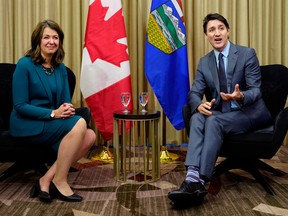Smith said that the province filed a reference case with the Alberta Court of Appeal on Thursday

“(The) amendments contained some clever word games but still ultimately gave the federal government control over projects that fall under Alberta’s exclusive jurisdiction,” Smith told reporters at a news conference in Edmonton.
Smith said that the province filed a reference case with the Alberta Court of Appeal earlier in the day.
The ruling nevertheless left the door open for an Ottawa-led impact assessment system for projects bankrolled by federal dollars, prompting the Liberal government to push amendments to the legislation through Parliament in June.
Federal Environment Minister Steven Guilbeault and Natural Resources Minister Jonathan Wilkinson said in a joint statement that Smith was “choosing divisive politics over constructive collaboration.”
“With this action, Premier Smith is putting 45 projects under threat, including four in Alberta that are currently being assessed representing billions of dollars and hundreds of potential jobs in her home province,” reads the statement.
Sander Duncanson, a Calgary-based partner at law firm Osler, Hoskin & Harcourt LLP, told the National Post that Smith has a strong case against Ottawa.
“The federal government made relatively minor and superficial amendments to address the (Supreme) Court’s findings,” Duncanson said. “Many of the fundamental concerns that the provinces expressed about the Act — things like the federal Minister’s broad discretion to designate provincial projects for federal assessment and the federal government’s ability to block provincial projects on policy grounds — those concerns very much still exist.”
Duncanson added that he’s worried about the impact drawn out legal wrangling could have on Canada’s already checkered reputation as a place to do business.
“Unfortunately, constitutional litigation takes years. One of the biggest issues we’re facing as a country is that capital investment in energy and infrastructure is fleeing south of the border and to other jurisdictions, and regulatory uncertainty is one of the key drivers behind this.”
Duncanson’s words echoed those of the federal natural resources minister, who said on Thursday that Canada’s lucrative energy sector will be a key bargaining chip in its dealings with incoming United States president Donald Trump.
“We have a couple of months before the president is inaugurated and I think there’s time for some robust conversations between (our) countries,” Wilkinson said in an interview. “Both (have) been benefiting hugely from an economic perspective because of the trade that goes between us, particularly in energy.”
National Post
[email protected]
Our website is the place for the latest breaking news, exclusive scoops, longreads and provocative commentary. Please bookmark nationalpost.com and sign up for our daily newsletter, Posted, here.